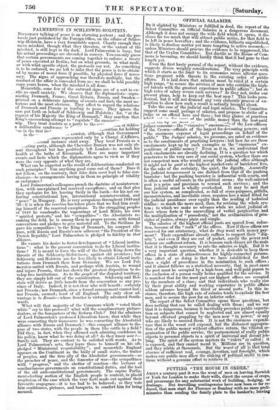OFFICIAL SALARIES.
BE it slighted by Ministers or fulfilled in deed, the report of the Select Committee on Official Salaries is a dangerms document.
Although it does not occupy the wide field which it attract opens, it closes far too much that will ract public notice, for that field to be left in peace hereafter ; and the evidence, hitherto unpublished, is likely to disclose matter yet more tempting to active research,— unless Ministers should procurethe evidence to be suppressed, like that of the Ceylon Committee. But ductile as the House of Com- mons is becoming, we should hardly think that it had gone to that length yet. Even the first hasty perusal of the report, mithout the evidence, suggests (livers weighty considerations. 'The very principle with which it starts as the limit to its economics raises ulterior ques- tions pregnant with threats to the existinn. order of public, high range,
affairs. It is laid down that salaries inust be°rated at a certain "to secure the services of men 40 Combine the high- high
p u, 'ei Affas " : but do est talents with the greatest exper ceien in To rates of salary secure such services ? do they' under our present plans, help to keep out the best men ?
position to show how such a result is aotually bro: t
recess of ex- IPaka Para- doxical, hut it will not demand any very elaborate' about.
Take the ease of the judicial and legal-
salaea. The he Committee suggest some small parings rl of salaries, d
judge Or an offieial -here and there b atn propose to strike off a
u they glance at practices
Whim. a the public of the T,n ‘.4g
t e money than the beat-paid judges consume—the " excessive ' emoinmeo.,
of the Crown—officials of the largest fee-devouring powers; aria- " the enormous expense of legal proceedings on behalf of the public." The Judges salaries, we presume, are rated on evidence as to the emoluments of practising lawyers : but how far are those emoluments kept up by such examples as the "enormous" ex- penditure of public money? Evenas it is, we understand that such emoluments are already declining. It is a question too which penetrates to the very core of our social system, whether there are not competent men who would accept the judicial office although it might not be paid at the highest market-rate of barEisters' fees, for the sake of the certainty, the quiet, the dignify., ,Assuredly the judicial temperament is one distinct from that Of the pushing barrister: but the pushing barrister is influential with courts, and is Often a useful advocate in the political arena ; the well-salaried post is a prize and provision to reward such services ; and the true judicial mind is wholly overlooked. It may be said that our law system, so complicated, so full of cross-purposes,
inconsistencies, and inevitable error, requirea less a mind fitted for the judicialpresidenee over laity than the reading of technical
the riddles: so much the more need, then, for revising whole sys- tem; to which we make no advance while we select judicial of- ficers whose forte is the =ravelling of verbal perplexities and the multiplication of "precedents," not the reelimination of prin- ciples of justice, always plain and simple. The salaries of the highest official posts are spared from reduc- tion, because of the "rank" of the offices. Now if these offices are reserved for our aristocracy, what do they want with money pay- ment? Their expenditure already suffices to support their "dig- nity"; and even if they are out of pocket, surely the ,power,and honour are sufficient return. It is because such classes- eet the eale that it is thought necessary to rate the salaries so high. But it is a very important question, 'whether it is desirable to keep these offices in a state of attractiveness for highly-connected persons. One effect of so doing is that we have established for that class a right of precedence in the nomination to such offices ; and it almost follows as a statistical necessity, that in most cases the post must be occupied by a high-born and welNlaid person to the exclusion of a person really better qualified for the service. It is manifest that for the most part our highest offices are occupied by the members of a class; and that individuals who really rise by their great ability and Working ex-perience in Public affairs seldom advance beyond the third or second posts. In this in- stance, therefore, the high rate of salaries tends to exclude the best men and to secure the post for an inferior order.
The report of the Select Committee opens these questions, but does nothing that can be called dealing With them; and we say that it is dangerous, because it inevitably provokes public expecta- tion on subjects that cannot be neglected and are almost equally beyond effectual grappling by the men now "in power," or any who are likely to succeed them. It is not the enormous expendi- ture that is the worst evil ,exposed, but the dishonest appropria- tion of the public money without effeetive return, the vitiated or- ganization of the public Service, the postponement of really public objects to personal objects in a spirit of universal and decent job- bing. The spirit of the system masters its "rulers " so called : it is exposed, and they cannot mend it. Millions are in question,
and they nibble at thousands. But the worst of all is that total absence of sufficient zeal, courage,wiie4iotion, and foresight, which makes our public men allow the sinking of political credit to con- tinue without a, genuine effort to retrieve it.


























 Previous page
Previous page